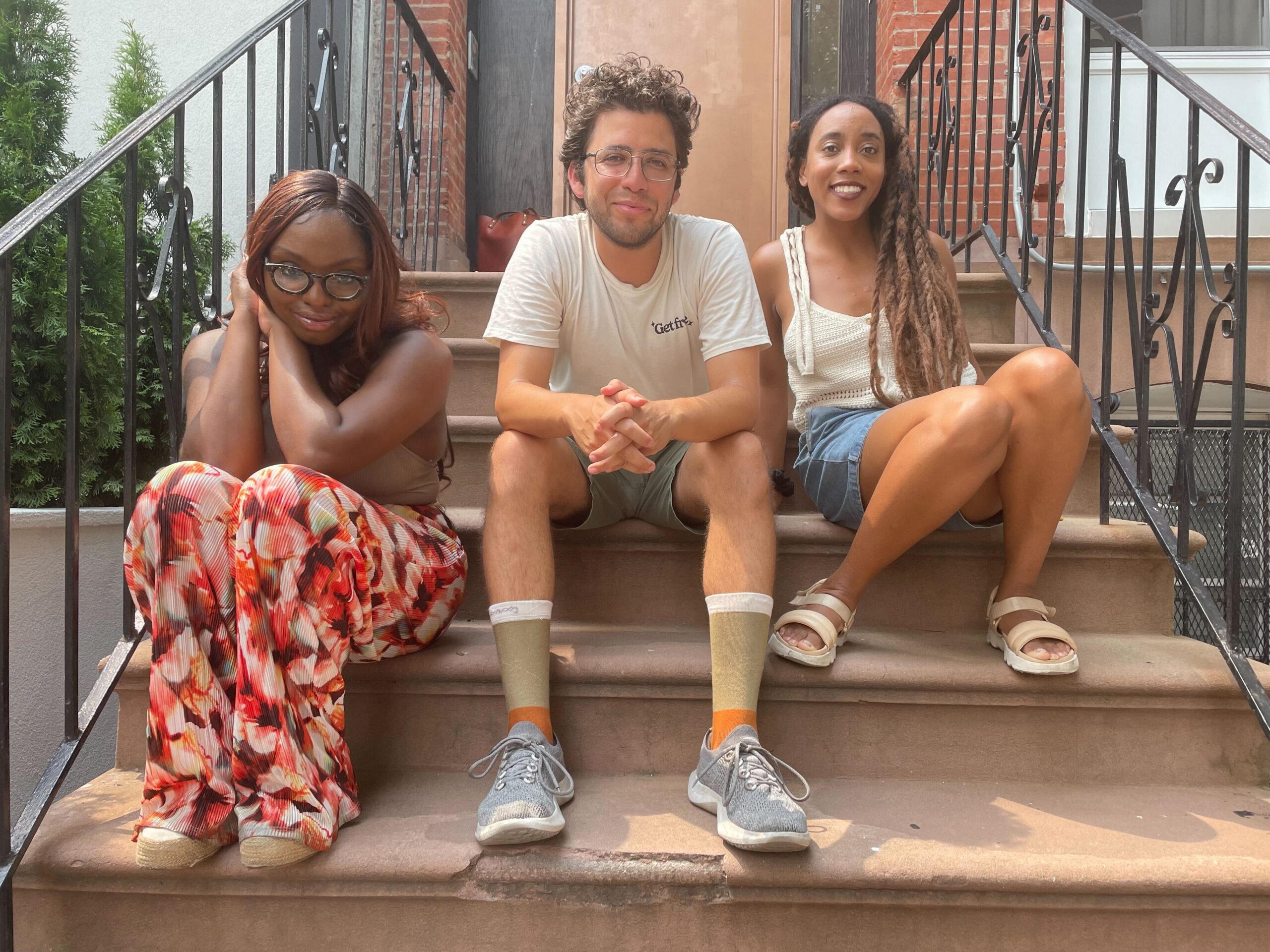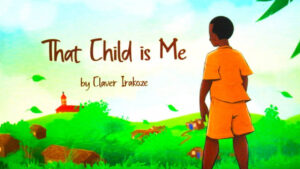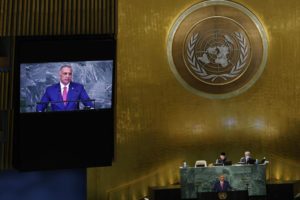Members of the New York state Legislature were in a bind.
It was late last year, several months after state lawmakers passed a billauthorizing a public commission to study reparations for New Yorkers of African descent. What they lacked, however, was public buy-in from Gov. Kathy Hochul, whose signature was necessary to create the commission.
That changed after a series of public actions by a group of Gen Z and millennial advocates brought added attention to the cause, including a banner drop at the Macy’s Thanksgiving Day Parade and a rally in early December by NYU students imploring the governor to “sign that bill.” On Dec. 19, Hochul finally got on board and signed it, making New York the second state to authorize a reparations commission, after California.
The success was celebrated by elected officials as well as younger activists, who have entered the fray over reparations. It’s a battle 400 years in the making — and one that seems, to most observers, a long way from concluding in New York or any state. Nonetheless, some see the participation of a new, younger set of activists as having potential to transform the discussions to come, injecting a new livelihood and urgency into ongoing debate..
“There’s an awakening, I believe, around this power that we have,” said Nicole Carty, the 36-year-old executive director of Get Free, a youth-led group that helped organize the actions.
Carty said many young Americans relied on their parents and others to enact change, but “now we’re coming up into a moment where we realize we’re the adults in the room. We get to decide what actually happens.”
The state’s nine-member reparations panel held its inaugural meeting July 30 in Albany. The group is charged with examining the historical and present-day consequences of slavery and discrimination, with the goal of developing recommendations for reparative justice.
The members have their work cut out for them.
A majority of Americans oppose reparations for the descendants of enslaved people, according to the Pew Research Center. Nonetheless, elected officials and activists are forging ahead and hoping to build support. They point to centuries of systemic racism in New York: In the 18th century, New York had the largest population of enslaved people of any city after Charleston. Enslaved men and women built some of the city’s most prominent landmarks, including City Hall and the wall from which Wall Street took its name.
The state was also a vital cog in the trans-Atlantic slave trade, according to historians. Well after the state outlawed enslavement, it enacted policies that fostered an enormous racial wealth gap. According to a 2023 report by city Comptroller Brad Lander, the median household net worth for Black New Yorkers was $18,870; meanwhile, for white New Yorkers, the figure was $276,900, or 15 times as much.
However, the prospect of reparations has been lambasted by New York Republicans, who call the effort improbable, misguided and divisive.
“I am confident this commission’s recommendations will be unrealistic, will come at an astronomical cost to all New Yorkers, and will only further divide our state,” Rob Ortt, the Senate Republican leader, said on X after Hochul greenlit the commission.
Assemblymember Michaelle Solages, a Democrat representing Nassau County who sponsored the legislation, said its passage was made possible because of a new generation of activists committed to reparations and whose end-of-year demonstrations helped overcome conservative opposition.
“I did see the difference,” Solages said in an interview. “These young people doing this work helped us secure and helped us to elevate this issue and work with the governor’s office to convince them that this is a community led issue and that it needs to be done with community.”
The path to the movement
Carty, who lives in Clinton Hill, cut her teeth in the Occupy Wall Street movement and the subsequent Black Lives Matter movement. Beginning in 2019, she said, more than a dozen other activists began to engage in discussions about a youth-led movement that would “change the conversation” on reparations as well as the underlying causes of racism and xenophobia in the country. She said both had been exacerbated during the presidency of Donald Trump.
“The reason why Trump was able to win was so much because of what hasn’t been reckoned within our society. He just reactivated all these old white supremacist lies and rode that to victory,” Carty said, pointing to the “scapegoating” of immigrants and Black people.
Get Free formally launched in May 2023 and conducted its first training for youth in October, a month before the banner action in Columbus Circle, at the Thanksgiving Day parade. It now has five full-time staff members, all in their 20s and 30s, including three in New York. The organization has conducted training workshops with around 50 people in New York and another 60 nationwide.
Staffers and volunteers said in interviews that their varied life experiences shaped their commitment to the cause.
Anthony Torres, the group’s 29-year-old communications director, grew up on Long Island. The son of a white mother and a Nicaraguan father, Torres said that in his youth he regularly witnessed people, including teammates and coaches on his childhood soccer team, deploy ethnic slurs against his darker-skinned father.
Meanwhile, he heard stories of how his mother’s family had turned to food stamps and other social support programs in the 1980s, when she was in her teens. Torres said these were “the very programs that white supremacist politicians and Republicans in power were trying to destroy,” in part by “using dog whistles and spreading lies about Black people.”
“I learned then how my fate and my family’s fate was linked to addressing these problems of inequality at their foundation,” Torres said.
Ivy Nicole, a 32-year-old volunteer with Get Free, is Black and grew up in Far Rockaway, the first in her family to attend college. Her grandfather, she said, moved to New York from South Carolina during the Great Migration. Prior to her own parents, her family had largely labored “in factories,” but her mother had a career in office administration while her father worked in I.T., allowing them to become homeowners.
Nicole said the stability afforded her family “occasional vacations to the Poconos” and “that one time we went to Disney World.”
“I feel very fortunate that we had that level of security and stability, and I think that all Black people are owed that,” she said.
Carty grew up in Atlanta. She said her father was born in 1945, the son of a minister, and that he grew up “under Jim Crow.” But he attended Morehouse College, a historically Black institution, where he majored in chemistry. He secured a job as a synthetic organic chemist at Merck before moving to IBM, where he worked as a computer engineer for decades.
“He was really in the first post-Civil Rights movement generation, the first moment in time when corporations, when companies were trying to actually hire Black men,” she said. “Before then, he would not have gotten a job.”
Carty’s father even featured in a 1967 recruitment ad placed by Merck in The Afro-American newspaper. His trajectory, she said, was due to “a brief moment of reparative policies in U. S. history.”
For Carty, her father’s story is instructive.
“We need to continue that work,” said Carty, “and then we will all benefit from it.”
Building power, with civility
Solages said the work of New York’s reparations commission is still in its early stages. An initial meeting last month, she said, focused on procedures for “how to continue and move forward.” The commission’s next step, she said, is to “solidify leadership” and hire staff. After that it could begin to partner with “research centers and historical experts” on the history of New York “from chattel slavery all the way to urban renewal.”
Solages said she was struck by the collaborative nature of the youth activists engaged in the discussions and said it’s a welcome departure from others in the broader movement.
“Even those people who agree with reparations, some of these groups are antagonistic, they’re getting in your face,” she said. “They don’t feel that collaboration and civility is a way to get to the end goal. It’s quite the opposite for these young people.”
Ultimately, she said, reparations would not be achieved “through hate.”
“It has to be done through love,” she said. “It has to be done through advocacy and dismantling these systems and promoting equity.”
The sentiment was echoed by Nicole, the volunteer who grew up in Far Rockaway.
“I believe fully and fundamentally that everyone who’s called to the work of justice is fundamentally a good person,” she said.
Torres said he and others in the organization were not interested in “feeling isolated and feeling righteous” and instead sought to “organize with people across differences.”
Trevor Smith, a volunteer with Get Free and the co-founder of the BLIS Collective, a group that promotes collaboration between Black and Indigenous communities, said youth groups were part of a broader collective called New Yorkers for Reparations. One of the highlights of the work, he said, was attending the governor’s bill signing last year.
“We were in the room with both young reparations advocates and elder reparations advocates,” he said, including Rev. Al Sharpton. “It was actually a really beautiful day and something that will stick with me for the rest of my life.”
For Carty, the Get Free executive director, the ultimate objective is clear: “We’re building power.”
Young people had served as the “engines behind every social movement in United States history,” she said.
“And millennials and Gen Z right now, those two generations are coming up in leadership in this country,” Carty said. “They get to change and decide the future of this country.”
Under the enabling legislation, the commission is charged with submitting a written report of its findings and recommendations no later than one year after its first meeting – by July 30.
A spokesperson for the governor’s office said in a statement all New Yorkers are encouraged to participate in the process as it continues over the next year.
Source: https://gothamist.com/news/could-young-activists-in-ny-be-difference-makers-in-reparations-debate




